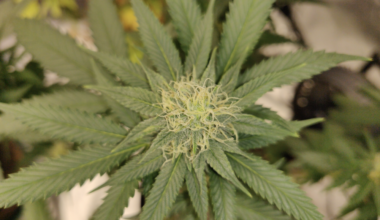Delaware lawmakers on Wednesday filed a newly revised marijuana legalization bill that has several changes from a previous version that passed a House committee last year but stalled ahead of a scheduled floor vote amid disagreements about equity provisions.
Rep. Ed Osienski (D) is sponsoring the legislation again. It would allow adults 21 and older to purchase and possess up to one ounce of cannabis, but it would not provide a home grow option.
A marijuana commissioner under the state Division of Alcohol and Tobacco Enforcement would be responsible for regulating the cannabis market and issuing business licenses for retailers, cultivators, manufacturers and laboratories.
Equity is built into the licensing scheme. After 19 months of the bill’s enactment, regulators would have to approve 30 retailer licenses, half of which would go to people identified as social equity applicants who have been disproportionately impacted by cannabis criminalization, for example.
There would also be a 15 percent excise tax on retail cannabis sales, which would not be applied to medical marijuana products. Seven percent of tax revenue from adult-use sales would go to a new Justice Reinvestment Fund, and the legislature would be tasked with appropriating the remaining revenue after administrative costs are covered.
The Justice Reinvestment Fund would support grants, services and other initiatives that focus on issues like jail diversion, workforce development and technical assistance for people in communities that are economically disadvantaged and disproportionately impacted by the drug war. The money would also be used to help facilitate expungements, according to a summary from the Marijuana Policy Project (MPP).
“We’re excited about the prospects for legalization in Delaware this year,” Olivia Naugle, a legislative analyst with MPP, told Marijuana Moment. “Delawareans have long supported ending prohibition, but it is up to the legislature to bring equitable legalization to Delaware. HB 305 is the vehicle to get it done this year.”
—
Marijuana Moment is already tracking more than 900 cannabis, psychedelics and drug policy bills in state legislatures and Congress this year. Patreon supporters pledging at least $25/month get access to our interactive maps, charts and hearing calendar so they don’t miss any developments.![]()
Learn more about our marijuana bill tracker and become a supporter on Patreon to get access.
—
When Osienski’s earlier bill was being considered last year, a similar equity fund provision was included, and the sponsor said he was caught off guard when he was informed that its inclusion meant the bill would require 75 percent of legislators in the chamber to approve it.
The lawmaker attempted to fix the problem with an amendment that was introduced shortly before the measure was expected to go to the floor, but that change was opposed by certain members of the Black Caucus, whose votes would be pivotal given the high threshold.
In the months since, Osienski has worked with the Black Caucus to build support and get passable legislation. And a clear sign of the progress is that Reps. Rae Moore (D) and Nnamdi Chukwuocha (D) are already signed on as cosponsors to this latest version after pulling their support in the 2021 session over equity concerns.
“We heard the input from members and advocates and spent the legislative break working on compromises wherever possible, striving to build the best possible law,” Osienski said in a press release. “It’s critical to note that support for adult recreational marijuana has been growing for years in Delaware and across the country. Other states have successfully enacted policies for safe and legal cannabis, and I believe we are more than capable of doing the same in the First State.”
“I’m looking forward to advancing this bill and making Delaware the next state to legalize adult recreational marijuana,” he said.
The newly revised bill will still require a supermajority threshold to pass, but a smaller one of 60 percent, according to House Democratic lawmakers.
Rep: Ed Osienski: “I’m looking forward to advancing this bill and making Delaware the next state to legalize adult recreational marijuana.”
Read more about HB 305 here: https://t.co/UmKCrEcd94
— DE House Democratic Caucus (@DEHouseDems) January 13, 2022
The bill, which has been referred to the House Health & Human Development Committee, would also establish a 15-member Marijuana Control Act Oversight Committee that would be responsible for advising on regulatory issues, the impacts of legalization on the illicit market and promoting diversity in the industry.
Several more modest amendments that were filed when the earlier bill was being considered last year have been incorporated into the revised legislation. That includes provisions on related to quality control standardization, accreditation for marijuana testing facilities and packaging and labeling requirements.
Portions of the bill on expungements were also removed, as they were made redundant by the enactment of separate legislation last year.
Individual municipalities would be able to establish their own regulations for the market related to operating times for marijuana businesses, locations of operation—and they would also be able to outright ban cannabis companies from being in their jurisdiction.
“At least three other states have legalized recreational marijuana use by adults since House Bill 150 was first introduced and more than 145 million Americans now live in one of the 18 states that have successfully replaced an illegal market with a well-regulated and responsible industry that is creating thousands of good-paying jobs for their citizens,” Sen. Trey Paradee (D) said.
“The benefits of a thriving cannabis industry are clear, and I give Rep. Osienski a ton of credit for his willingness to work for legislators and stakeholders to make a great bill even better,” the senator said. “This legislation is sound economic policy, represents strong social justice reform and will create jobs throughout our state. It’s time for Delaware to catch up with the rest of the country and pass HB 305.”
A legalization bill previously received majority support on the House floor in 2018, but it failed to receive the supermajority needed to pass.
Gov. John Carney (D), for his part, is a rare type of Democratic governor who remains opposed to recreational cannabis legalization—another challenge for lawmakers during this year’s session.
Despite his wariness about adult-use legalization, Carney did sign two pieces of marijuana expungement legislation in recent years. In 2017 and 2018, a state task force met to discuss issues related to legalization, and the governor hosted a series of roundtable meetings about cannabis.
Carney’s predecessor approved a measure to decriminalize simple possession of cannabis in 2015.
Last year, Delaware activists mounted a boycott against four medical cannabis operators after representatives of those companies testified in opposition to the adult-use legalization bill during its March committee hearing.
An analysis from State Auditor Kathy McGuiness (D) released last year found that Delaware could generate upwards of $43 million annually in revenue from regulating marijuana and imposing a 20 percent excise tax. The legal market could also create more than 1,000 new jobs over five years if the policy is enacted, according to the report.
Mississippi Senate Votes To Legalize Medical Marijuana, Defying Governor’s Veto Threat
Photo courtesy of Mike Latimer.
Medical Disclaimer:
The information provided in these blog posts is intended for general informational and educational purposes only. It is not a substitute for professional medical advice, diagnosis, or treatment. Always seek the advice of your physician or other qualified healthcare provider with any questions you may have regarding a medical condition. The use of any information provided in these blog posts is solely at your own risk. The authors and the website do not recommend or endorse any specific products, treatments, or procedures mentioned. Reliance on any information in these blog posts is solely at your own discretion.







